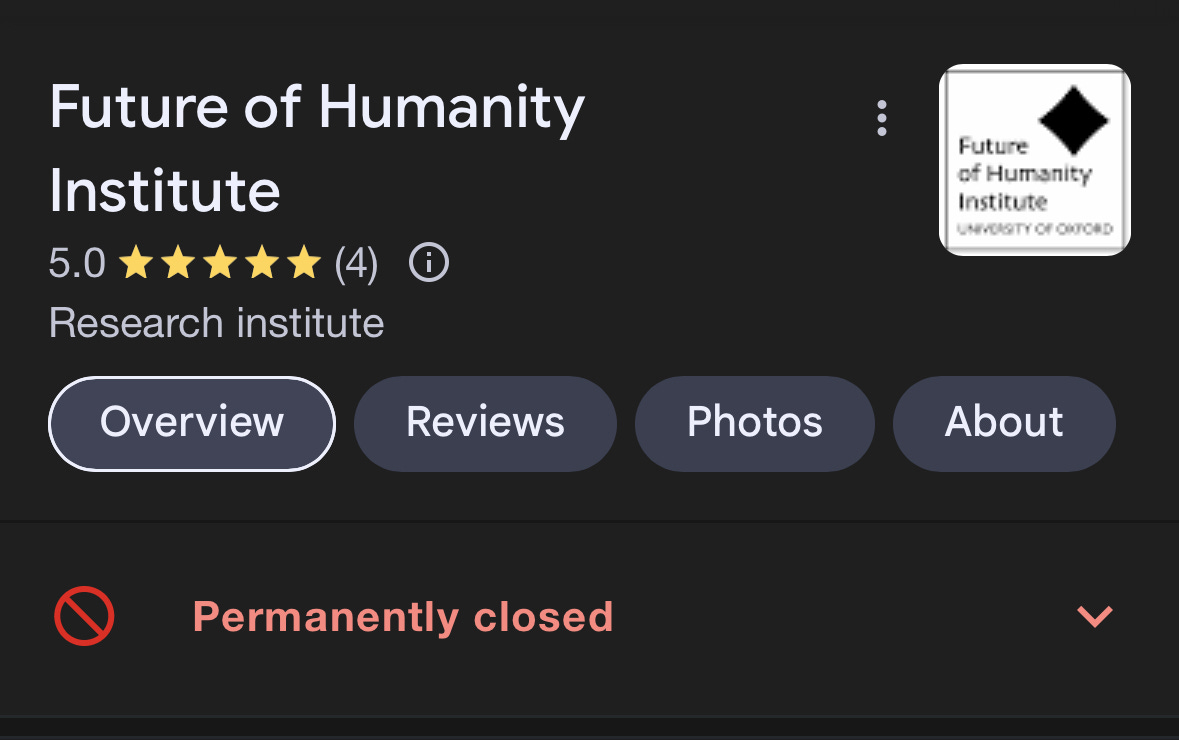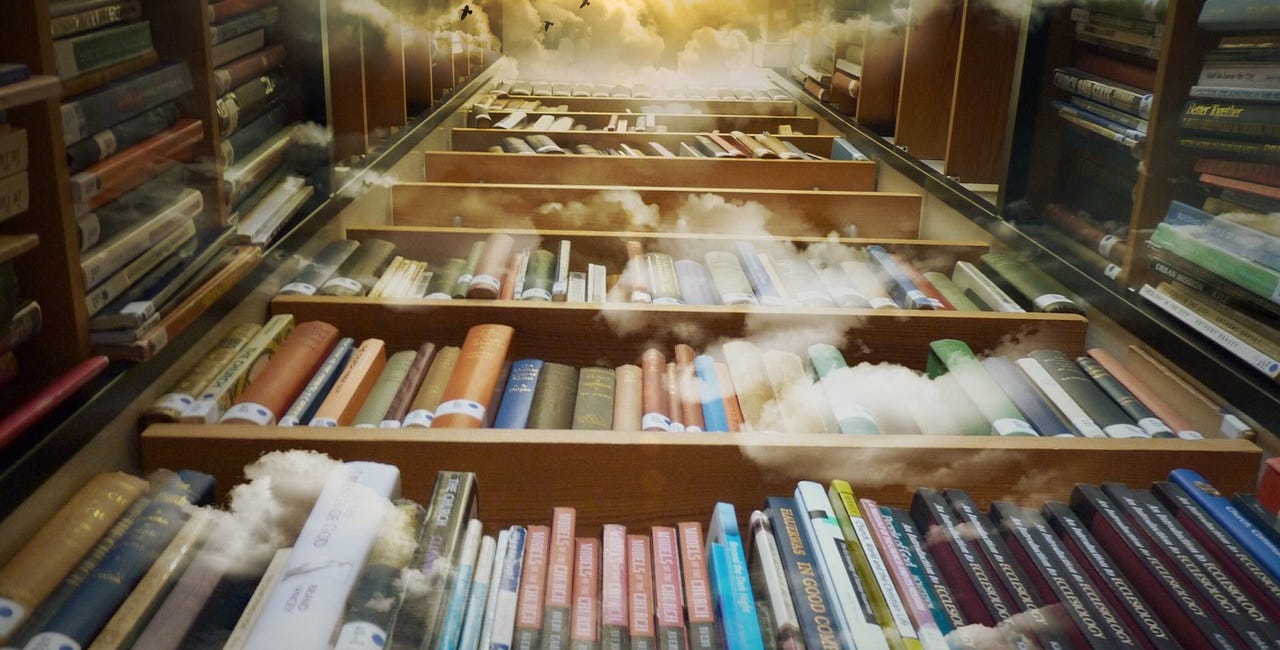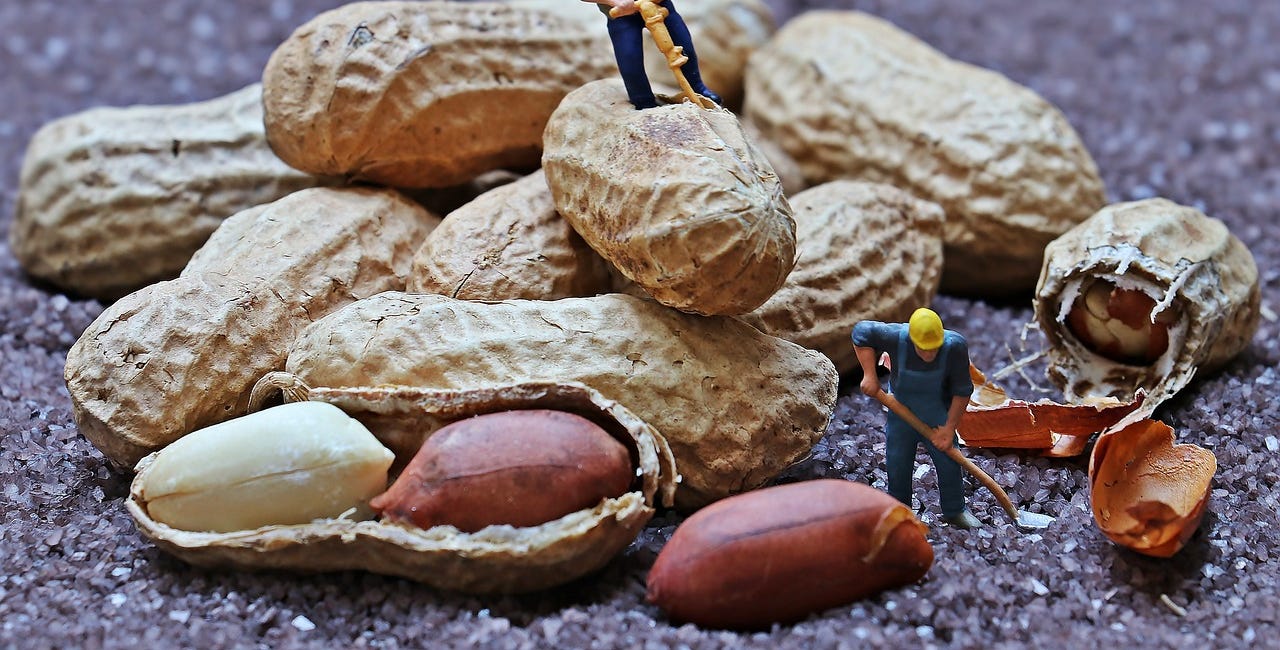Healing Personal Wounds: Your Essential Role in Humanity's Future
The Future of Humanity Institute has closed. Report here for your new assignment
The Future of Humanity Institute has closed. To be honest I didn’t know it existed. Then Utopian Substacker Elle Griffin made a list of places relevant to her hopeful, forward-thinking subscribers. I googled it and got the news.
Four five-star reviews and closed? Well yes, four. Not four thousand.
What happened, I can only speculate. Not because I couldn’t research it if I wanted to (actually I couldn’t resist and it may be a bit interesting), but because the Institute’s closure is only a cheeky bouncing-off point for this post. Let’s pretend we know nothing. The Future of Humanity Institute, farewell. Funding dried up? Watched too much news, utterly gave up on humanity and went to the pub? I don’t blame you.
Happily, though the Institute is closed, Humanity still has a Future.
Oh yes, it does.
We are not at the panto (much as I love that venerable British tradition) so I’m not going to bat this back and forth. But I would like to persuade you that we do indeed have future and that you, yes you, little you, or substantial and wonderful you (take your pick) have a role in this.
You are a member of humanity, are you not?
(Wait? Are you a bot? Choose all the squares containing a motorcycle. Yes, even that square containing just the edge of one of the tyres. Try putting a valid email address in this little box and pressing ‘Subscribe’.)
Success! You are a member of humanity, and thus automatically recruited to the Future of Humanity project. This project requires no Institute, only your commitment to doing something that will benefit you in infinite ways. I know, can you imagine? It’s like giving yourself a warm candlelit bath and an early night and discovering by some fluke of a butterfly’s wings that your actions prevented a whole Indonesian village from being wiped out by a tsunami.
A barely plausible simile, I think we can agree. Yet with ripple effects, over time, individual actions do indeed have widespread, even global, consequences. Imagine if Adolf Hitler had stuck with watercolours.
The something that will both benefit you and humanity as a whole? Take your pick. Here are the assignments in reverse order; if Assignment 2 looks too difficult right now, scroll down to Assignment 1.
Assignment 2: healing your emotional wounds
Okay. I know. Sounds difficult or irrelevant. But hear me out.
One of the strangest responses to last week’s post about sexual assault and other forms of personal injury was a conversation (on Notes) with a man who wanted me to shift from healing my own wounds to solving the whole problem of male violence. When I unwound my stick-to-your-wheelhouse philosophy, he demanded ‘How are you going to stop Putin?’
Fella, I can’t stop Putin. I don’t even know the guy. I literally have zero influence on Putin or any other major warmonger. Hell, I can’t even stop the guys in my locality from pissing on my doorstep.
Actually, I am lying for comedy. I put planters on either side of my doorstep filled with flowers, and when a drunk man smashed one for a laugh (caught on the next building’s CCTV), I replaced them with wooden troughs firmly screwed to the wall, with evergreen plants in them, and ever since then, apparently, my front door no longer looks like an inviting outdoor toilet.
Personal wound healing is as solution-focused as those planters. Look around you, and at the bottom of every horror story that the news is feeding you, what is the root cause? Wounded humans. Now you may not think of Putin (for example) as a wounded man, but no baby is born a sociopath.
Babies are born innocent (nope, not buying into ‘original sin’) with a full capacity for love, joy and wonder. What happened to Putin between cute baby Putin (I know, try) and the dangerously warped power-hungry Putin?
Growing up hungry in war-ravaged Leningrad, where his mother had almost starved to death while his father was fighting the Nazis. Fighting for scraps on the street while being over-adored by a woman who had been through hell. By the time most people are starting primary school, he already had the world down as a kill-or-be-killed kinda place.
Look in his eyes. He was already carrying his wounds, his father’s wounds, and a bunch of his own. (And in further research, I discovered it might be even more complicated.)
Where did his family’s suffering come from? Simplistically and yet directly, Hitler’s suffering, the brutal violence in that family. Which came from…
You get the point, I hope. The whirlwind we’re reaping now from Putin comes from generational trauma; layer upon layer of brutality and suffering in individual families. We cannot go back and undo History. But we can – individually – make a positive difference to the future.
But whatabout whatabout whatabout… ? Fill in the horrorshow that most concerns you.
Is there anything you can directly do that will make a positive contribution? If so, do it. But if the answer is no, then hand-wringing or lying awake at night or shouting at strangers on the internet isn’t doing anything to fix The Horrible State of Things. In fact, it’s making The Horrible State of Things more horrible, because you’re either paralysed by your sense of powerlessness (thus making no contribution to Humanity’s Future) or making other people depressed, anxious or angry (thus making a negative contribution to Humanity’s Future).
To be any kind of a beacon leading others out of this mess we find ourselves in, you will need to heal your wounds. Remember that thing Jesus said about the meek? Let’s take that seriously for a minute. What does it mean to be meek? It means to be at peace with the way things are, and not retaliate or rage against them. It means a gentle and understanding approach to other suffering humans, even those who act out murderously. Unpopular opinion, I imagine. It definitely takes work.
Storytelling sub-routine
Twenty years ago, my (second and current) husband developed a serious chronic illness (ME/CFS). We were extremely happy at the time, but eventually, a couple of years down the line, the illness swallowed him up. His anger and frustration boiled over into fury at me for doing a PhD (which I had started chiefly to increase my earning capacity, once I’d realised he was never going to work again). Almost as soon as I got (miraculously) funded to do my PhD, the arguments began. It was selfish of me to be doing this now. If I loved him, I would give up my PhD and nurse him, even though I am a rubbish nurse and we’d lose our house and have to move with four children into a van.
Fortunately, I learned a very important principle in my first marriage: if someone you love asks you to give up the thing you love, the answer is no.
This caused five years of arguments. At first, if he shouted, I shouted back. Which always made things worse. Then, in looking desperately for anything that might cure his illness, I stumbled on EFT tapping. Things had broken down between us, so Mr Stones wasn’t interested in any of my ‘solutions’. Having learned EFT to ‘help’ him, and feeling powerless and frustrated, I used it on my own emotional turmoil. EFT gave me insights into what was being triggered when he shouted at me: old childhood wounds. Day by day, I used tapping to heal those old wounds, and gradually, I became less and less easy to trigger. My kids noticed I was less spiky and more stable. And so did he.
Apparently, it’s not satisfying to shout at someone who has stopped shouting back. The immediate effect was that he ramped up the hurtfulness of his words, jabbing for a reaction. Which just gave me deeper levels of old wounds to heal with tapping. And every time I tapped through my anger at him (which was profound), all I ever found at the bottom of it was love. I’d remember him as he was when we first dropped our defences in Costa Rica in 2001. I knew that person was still there, in the belly of the monster that was the illness.
One day, he was standing in front of me, in a rage, plucking albums out of his beloved vinyl collection and smashing them on the brick floor. Instead of being frightened or angry, I was moved to tears to see the pain in him. I saw a hurt child who had never healed from his bullying in the outside world and his suffocation under his mother’s nervous eye. I said to him sadly, ‘Look what you’re doing. You’ll be so upset tomorrow.’ He stormed off, but the next day (it always took him that long to calm down) he came to me and said, ‘I have been an absolute idiot. I thought it was you making me angry, but now I realise it’s me. No matter how much anger I throw at you, all you come back with is love.’
This is what it means to be ‘meek’, and it turned my second marriage around. Through the ripple effect, it has done (and can still do) a great deal more good than that.
There was a time when this work was beyond me, though. I was not ready, not equipped. If that is you, then consider:
Assignment 1: focus only on what makes you happy
This sounds like the ultimate in selfishness. But if you are happy then you will, by default, be making a positive contribution to society. Even if only through not being that black cloud that drifts through other people’s awareness.
If you are in a bad place, you will have to start small. When I was suicidal for the nth time 24 years ago, I used to count the very simplest of blessings. I have a roof over my head. I turn this tap and have clean drinking water. I may not be a published poet or novelist (I wasn’t then) but I can write. I may be struggling as a single mum (I definitely was) but I do have children (which my sister, at the time, was longing for).
I made a point of looking for the simple but lovely stuff. The sunlight falling through the blinds. That little buttercup next to me on the school playing field. The warmth of a cup of tea in my hands. What Gillian of Gillian & Li'l Bean calls ‘glimmers’. Instead of focusing on all the things I didn’t have (a lover, money, a career, friends, happy offspring), which made me depressed and furious, I focused on all the things I did. Through the daily practice of turning my attention to these tiny glimmers of goodness in my life, more goodness (and all the things I had lacked) began to find their way towards me.
Because for reasons probably explained by our living in a quantum universe, what we focus on expands.
It's age-old wisdom, and not in the slightest bit original, but this is Assignment 1. Count your blessings. Focus on what is good in your life; give energy only to things you want to see more of. If something makes you angry or unhappy, don’t honour it with your attention. Don’t let a Peanut Morning become a Peanut Life.
Remember, too, that unhappy people damage people (‘hurt people hurt people’.) Like Larkin’s popular parents, ‘They may not mean to but they do.’ Breaking the chain of generational damage is a profoundly important contribution to the Future of Humanity, and the more of us do it, the brighter our collective future will look.
If you’ve reached this point, congratulations! You are recruited to the Future of Humanity project.
Share three things that you appreciate about your life right now.
+++ If you found value here, ‘like’ the heart so others can more easily find this post +++
My weekly posts drop free into the inbox of all subscribers. If you value what I do and/or want access to the inside story with membership of the Secret Diary Club, consider a paid subscription. Thanks for reading and sharing!
More posts like this:
Humans 2.0
We live in an era that magnifies unhappiness. The 24-hour news cycle mines endless sources of misery and transmits them into our pockets. Social media algorithms heighten loneliness and addiction while rewarding and amplifying outrage and envy. The principle of idiocracy — that dimwits have no issue declaiming their every thought while the intelligent h…
A Peanut Morning
I was having a peanut morning. I don’t like peanuts, so this is not a good thing. At primary school, my headmaster Mr Hancock stood over me and forced me to eat a peanut folded into a lettuce leaf. I threw up on his shoes. If you have eaten peanuts within the last hour, I will try not to be in the same room as you because …







1. Your post: the humour, vulnerability and common sense - a reminder.
2. The iris in bloom in the little front garden.
3. The weird (but understandable) way my mum's current dementia-storm in hospital has brought my sister and me closer again after a recent fall-out.
Sight, the fact that the world is in three dimensions, and the Joy that brought me to this post. $;-)